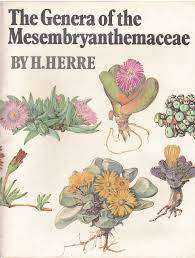
"THE GENERA OF THE MESEMBRYANTHEMACEAE" BY DR. H HERRE
Check my rate
| Main centres: | 1-3 business days |
| Regional areas: | 3-4 business days |
| Remote areas: | 3-5 business days |

| Main centres: | 1-3 business days |
| Regional areas: | 3-4 business days |
| Remote areas: | 3-5 business days |
"THE GENERA OF THE MESEMBRYANTHEMACEAE" BY DR. H HERRE, HARDCOVER, FIRST EDITION, 1971, 316 PAGES. IN EXCELLENT CONDITION.
Hans Herre (18951979) was a German-born horticulturist and botanist, renowned as a leading authority on the Mesembryanthemaceae plant family. Often called the "father of Mesembryanthemaceae," he significantly expanded knowledge of these plants through his field explorations and work as curator of the Stellenbosch University Botanical Garden in South Africa.
Herre served as curator of the Stellenbosch University Botanical Garden from 1925 to 1962. During his tenure, the garden became internationally recognized and reached its "heyday" in terms of succulent plant diversity. He conducted many expeditions to botanically rich areas of southern Africa, including Namaqualand, the Richtersveld, and the Karoo. This led to the discovery and introduction of numerous new species and genera of Mesembryanthemaceae. His most famous work, The Genera of the Mesembryanthemaceae, was published in 1971. This comprehensive book includes identification keys and distribution maps; detailed botanical drawings by artists from the Bolus Herbarium; descriptions of the genera, a history of the family, and information about other researchers.
Herre was known for his success in cultivating difficult succulent plants. He was the first person to successfully grow the ancient desert plant Welwitschia mirabilis from seed to seed in cultivation, an achievement that made international headlines in 1949. Herre's legacy is honored by the naming of several species and the genus Herreanthus after him. A Mesembryanthemaceae species, Conophytum herreanthus, was also named in his honor and is now extinct in the wild, making the Stellenbosch collection a vital conservation resource. Herre was an early adopter of color photography and created postcards of the spectacular mass flowering events of Namaqualand. These helped publicize the botanical spectacle to a wider European audience.
